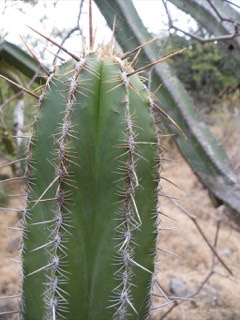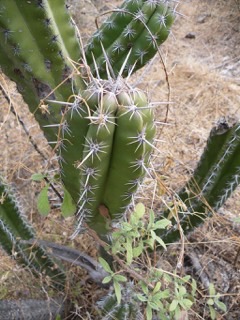 |
|
Amante Darmanin from Wikimedia Commons. |
 |
| Amante Darmanin from Wikimedia Commons. |
Translate this page:
Summary
A cactus. This is the only species in the Genus Escontria. The fruit is sweet, edible and very delicious with a gooseberry flavour. It is used in marmalade and ice cream and as a juice. It makes a good living fence.
Physical Characteristics

 Escontria chiotilla is an evergreen Perennial growing to 7 m (23ft) by 4 m (13ft) at a medium rate.
Escontria chiotilla is an evergreen Perennial growing to 7 m (23ft) by 4 m (13ft) at a medium rate.
See above for USDA hardiness. It is hardy to UK zone 10.
Suitable for: light (sandy), medium (loamy) and heavy (clay) soils, prefers well-drained soil and can grow in nutritionally poor soil. Suitable pH: mildly acid, neutral and basic (mildly alkaline) soils. It can grow in semi-shade (light woodland) or no shade. It prefers dry or moist soil and can tolerate drought.
UK Hardiness Map
US Hardiness Map
Synonyms
Cereus chiotilla F.A.C. Weber. Myrtillocactus chiotilla (F.A.C. Weber) P.V. Heath
Plant Habitats
Edible Uses
Edible Parts: Fruit
Edible Uses: Drink
Edible Portion: Fruit. The purple fleshy fruit are eaten fresh. They are also used in marmalade and ice cream. They are also used for juice. The fruit are also dried and said to have a gooseberry flavour. They are sold in Tehucan markets under the name geotilla and tuna [183].
References More on Edible Uses
Medicinal Uses
Plants For A Future can not take any responsibility for any adverse effects from the use of plants. Always seek advice from a professional before using a plant medicinally.
None Known
References More on Medicinal Uses
The Bookshop: Edible Plant Books
Our Latest books on Perennial Plants For Food Forests and Permaculture Gardens in paperback or digital formats.

Edible Tropical Plants
Food Forest Plants for Hotter Conditions: 250+ Plants For Tropical Food Forests & Permaculture Gardens.
More

Edible Temperate Plants
Plants for Your Food Forest: 500 Plants for Temperate Food Forests & Permaculture Gardens.
More

More Books
PFAF have eight books available in paperback and digital formats. Browse the shop for more information.
Shop Now
Other Uses
Fencing Fodder
Carbon Farming Solutions - Agroforestry Services: living fence (Agroforestry is a land use management system in which trees or shrubs are grown around or among crops or pastureland). Fodder: bank.
Special Uses
Carbon Farming Food Forest
References More on Other Uses
Cultivation details
Agroforestry Services: Living fence Fodder: Bank Management: Standard Regional Crop
Climate: tropical highlands. Humidity: arid to semi-arid. Full Sun to Partial Shade. Drought-tolerant; suitable for xeriscaping. Soil pH: 6.1 (mildly acidic) to 7.8 (mildly alkaline). Carbon Farming Solutions - Cultivation: regional crop. Management: standard (Describes the non-destructive management systems that are used in cultivation) [1-1].
Carbon Farming
-
Agroforestry Services: Living fence
Simply managed rows of shrubs and trees.
-
Fodder: Bank
Fodder banks are plantings of high-quality fodder species. Their goal is to maintain healthy productive animals. They can be utilized all year, but are designed to bridge the forage scarcity of annual dry seasons. Fodder bank plants are usually trees or shrubs, and often legumes. The relatively deep roots of these woody perennials allow them to reach soil nutrients and moisture not available to grasses and herbaceous plants.
-
Management: Standard
Plants grow to their standard height. Harvest fruit, seeds, or other products. Non-Destructive management systems.
-
Regional Crop
These crops have been domesticated and cultivated regionally but have not been adopted elsewhere and are typically not traded globally, Examples in this broad category include perennial cottons and many nuts and staple fruits.
References Carbon Farming Information and Carbon Sequestration Information
Temperature Converter
Type a value in the Celsius field to convert the value to Fahrenheit:
Fahrenheit:
The PFAF Bookshop
Plants For A Future have a number of books available in paperback and digital form. Book titles include Edible Plants, Edible Perennials, Edible Trees,Edible Shrubs, Woodland Gardening, and Temperate Food Forest Plants. Our new book is Food Forest Plants For Hotter Conditions (Tropical and Sub-Tropical).
Shop Now
Plant Propagation
Seed - direct sow after last frost. Seed Collecting: Allow unblemished fruit to ripen; clean and dry seeds. Unblemished fruit must be significantly overripe before harvesting seed; clean and dry seeds. Properly cleaned, seed can be successfully stored.
Other Names
If available other names are mentioned here
Chiotilla, Jiotilla, Quiotilla, Chiotilla Cactus, Geotilla fruit, Tuna fruit
Native Range
NORTHERN AMERICA: Mexico, Guerrero, Michoacán de Ocampo, Oaxaca, Puebla,
Weed Potential
Right plant wrong place. We are currently updating this section.
Please note that a plant may be invasive in one area but may not in your area so it's worth checking.
None Known
Conservation Status
IUCN Red List of Threatened Plants Status : Status: Least Concern

Growth: S = slow M = medium F = fast. Soil: L = light (sandy) M = medium H = heavy (clay). pH: A = acid N = neutral B = basic (alkaline). Shade: F = full shade S = semi-shade N = no shade. Moisture: D = dry M = Moist We = wet Wa = water.
Now available:
Food Forest Plants for Mediterranean Conditions
350+ Perennial Plants For Mediterranean and Drier Food Forests and Permaculture Gardens.
[Paperback and eBook]
This is the third in Plants For A Future's series of plant guides for food forests tailored to
specific climate zones. Following volumes on temperate and tropical ecosystems, this book focuses
on species suited to Mediterranean conditions—regions with hot, dry summers and cool, wet winters,
often facing the added challenge of climate change.
Read More
Expert comment
Author
(A.A.Weber ex K.Schum.) Rose
Botanical References
Links / References
For a list of references used on this page please go here
Readers comment
| Add a comment |
|
If you have important information about this plant that may help other users please add a comment or link below. Only comments or links that are felt to be directly relevant to a plant will be included. If you think a comment/link or information contained on this page is inaccurate or misleading we would welcome your feedback at [email protected]. If you have questions about a plant please use the Forum on this website as we do not have the resources to answer questions ourselves.
* Please note: the comments by website users are not necessarily those held by PFAF and may give misleading or inaccurate information.
To leave a comment please Register or login here All comments need to be approved so will not appear immediately.
|
Subject : Escontria chiotilla
|
|
|
|